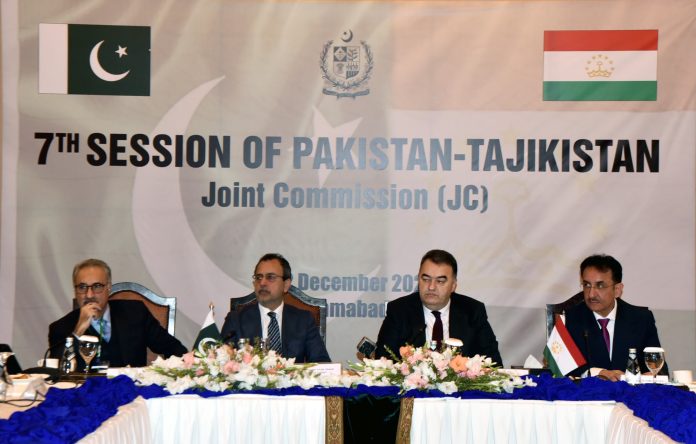Pakistan and Tajikistan have strengthened their bilateral relationship by signing two significant memorandums of agreement during the seventh session of the Pakistan-Tajikistan Joint Commission held in Islamabad this week, according to Radio Pakistan.
Power Minister Sardar Awais Leghari announced on Wednesday that both nations had agreed to establish a joint coordination committee to address transit trade challenges. This initiative is part of Pakistan’s broader strategy to position itself as a key trade and transit hub, connecting landlocked Central Asian states to the rest of the world.
The recent flurry of diplomatic visits, investment discussions, and economic engagements underscores the growing relationship between Pakistan and Central Asia.
Tajikistan, Pakistan’s closest neighbor in Central Asia, is separated by a narrow 14km strip through the Wakhan corridor, highlighting the geographic and strategic proximity of the two countries.
The agreements include a memorandum forging a partnership between Pakistan’s Khyber-Pakhtunkhwa (KP) province and Tajikistan’s Khatlon province, aimed at enhancing cooperation and mutual development.
Another agreement was signed between the football federations of the two countries, further strengthening cultural and sports ties. Additionally, a business-to-business forum is scheduled to take place in Islamabad on December 13, offering opportunities to bolster trade relations.
Speaking at the Joint Commission alongside Tajikistan Energy Minister Juma Daler Shofaqir, Leghari emphasized the importance of exploring new avenues of commercial and economic cooperation.
He noted the creation of the joint coordination committee under the Tajikistan-Pakistan trade transit agreement as a pivotal step toward addressing operational challenges and ensuring the effective implementation of transit trade provisions.
He expressed hope that these discussions would result in concrete recommendations for advancing growth in trade, energy, agriculture, education, and industrial sectors.
Leghari called for a plan of action to enhance trade volume by removing barriers and promoting trade activities. According to Tajik Customs, bilateral trade between Pakistan and Tajikistan in 2023 amounted to $52.73 million, reflecting a 62.3 percent increase compared to the previous year.
He also highlighted the importance of regional connectivity, encouraging Tajikistan to utilize Pakistan’s trade corridors from Dushanbe to Gwadar and Karachi under initiatives like the Central Asian Regional Economic Cooperation program.
The minister emphasized the strategic potential of the Wakhan corridor for direct connectivity and the significance of the CASA-1000 project, a $1.2 billion initiative aimed at transferring 1,300 megawatts of surplus electricity from Central Asia to energy-deficient markets in South Asia.
This ambitious project involves constructing a 1,227km cross-border transmission line connecting Kyrgyzstan, Tajikistan, Afghanistan, and Pakistan. Leghari expressed hope for the expedited completion of the remaining work on CASA-1000 to unlock its full potential and ensure mutual benefits in the power sector.


